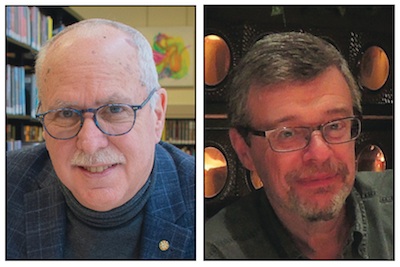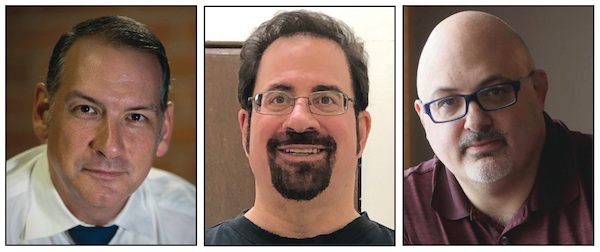Launching within hours of each other in May, the Canadian Jewish Record and TheJ.ca come at journalism from different perspectives.
Like print media as a whole, Jewish newspapers worldwide have been struggling in recent years. The coronavirus, with its economic impacts, was the last straw for Canadian Jewish News, which announced its closure in a message to readers April 13, with the words: “Everything has its season. It is time.”
From the ashes of that flagship media outlet, though, has emerged not one but two new ventures – and rumours of a possible revival of CJN itself.
Launching within hours of each other in May, the Canadian Jewish Record and TheJ.ca come at journalism from different perspectives and the people behind them think there’s room for a range of online voices, even if a national hard-copy print media option isn’t in the picture.
The Record is the brainchild of Bernie Farber, former chief executive officer of the now-defunct Canadian Jewish Congress, and Ron Csillag, a longtime reporter and editor with CJN, whose writing has appeared in the Jewish Independent. TheJ.ca, which has been in the planning stages longer, was started by Winnipeggers Marty Gold and Ron East. The editor is Dave Gordon, a Torontonian whose writing has appeared frequently in the Independent, as well as scores of other Jewish and non-Jewish publications.

Farber and Csillag admit they don’t have a business plan beyond getting writers and editors to work for free – and they see their online venture as a stopgap that would probably cease or merge were CJN to return. The individual rumoured to be considering a rebirth of the paper opted to not comment for this story.
Farber, who was with CJC from 1984 until it was subsumed by the Centre for Israel and Jewish Affairs in 2011 and served as its head from 2006, said they launched CJR on the fly, trying to fill a need in the immediate aftermath of CJN’s demise.
“Our goal is not to become a new Canadian Jewish News,” he said. “When and if they were able to come back up … we would find some way to amalgamate. Nothing is written in stone…. We expect to continue into the fall at this point, hopefully.”
The online news and commentary site operates under the auspices of a nonprofit organization and has no money to speak of, other than enough to cover registration fees and miscellaneous costs, said Farber.
“Everybody who wrote and who is continuing to this day to write for the newspaper is doing it pro bono,” he said. “These are skilled, professional journalists who are, for the most part, people who are used to being paid for their work and have chosen to do this as a donation at this time to the community. It really is a grand mitzvah, Canadian Jewish-style, and it’s working.”
The platform got 22,000 hits in the first week, said Farber, who serves as publisher. “It’s going up from there almost exponentially.”
The model upon which their editorial approach is based is akin to CJN, he said, with a range of opinions represented.
“We’re trying to have a big tent,” he said. “We already got into some hot water because we published a piece by Dr. Mira Sucharov. She’s a wonderful writer, she’s on the edge, people don’t like what she writes, but tough shit. People are allowed to have their opinions.”
JI readers will be familiar with Sucharov’s writing. As for coverage of Israel-related topics, Farber said they will follow a similar open approach.
“It’s not that we don’t support Israel,” he said. “We’re a news source, we’re an information source. We run opinion. We’re not going to [say] you can only write good things about Israel or good things about the Jewish community. We want there to be some spark to it where people can say, no, I disagree with that. We do have an option for feedback and we do get letters to the editor. That’s the Jewish community, right? They are vibrant, they come from all over the place and we want to be able to reflect that.”
Farber and Csillag are well-known figures in the Jewish and larger Canadian scene, which is one of the reasons, they say, that the president of York University reached out to them before releasing a much-awaited report of an investigation around a violent confrontation on campus last November between pro- and anti-Israel groups. The Record got embargoed exclusive access to the report before other media. “It demonstrates how, in a short period of time, we have become a reasonable voice in the community,” Farber said.
Csillag, the editor, said they chose, at the launch on May 21, to “flood” the site with stories to keep readers engaged and coming back. Now, the aim is to post two stories a day plus any breaking news.
“People are talking about it, people are complaining about it,” he said. “I got my first bit of hate mail, which is good. That’s when you know you’re making a difference.”
Finding writers to work for free has not been a challenge. “People have been coming out of the woodwork. I never knew that pretty much everyone on the planet was a writer,” Csillag said, laughing.
Challenges they have not ironed out, they admit, include finding reliable reporters outside Ontario and a steady source of news from Israel, since they don’t have the resources to pay for a news service.
If CJN is not revived, Farber said, “I think we have to get together with serious-minded people within the community and say the CJN is gone and we are here. We don’t have a real business model to be honest. What you see is what you get…. We would have to ramp up to a real business model.”
Farber added that Canada, with the world’s fourth-largest Jewish population at 400,000, should be able to sustain at least two national Jewish media platforms.
That confidence is shared by Gordon, who equates the situation to the old joke about the Jew who, when rescued from a deserted island, was asked why he built two synagogues on the island. One, he told rescuers, was his shul; the other was the one he would never set foot in.

TheJ.ca has been in the planning stages for more than a year. Gordon came on a few weeks before launch. Like the Record, TheJ.ca has little overhead, since everyone associated with it works remotely. They have a few investors and some steady advertising agreements. The online nature of the platform also means no printing or distribution expenses.
Gordon touts the diversity of the large stable of writers.
“One of the things that I think is our proudest asset are individuals from the widest array possible, individuals who are liberal to conservative, Jew and Arab, religious to secular,” he said. “We have four gay columnists, we have Jews of colour who are contributing, we have coast-to-coast contributors and, in that respect, I want to say that, not only do we deliver the unexpected, but we represent the previously unrepresented.”
On Israel coverage, though, they aim to determine suitability of opinions based on the “three Ds” formulated by Natan Sharansky to determine if criticism of Israel is antisemitic: delegitimization of Israel, demonization of Israel, and subjecting Israel to double standards.
“In terms of Israel, we’re not going to make it a secret: we’re very pro-Israel, very Zionistic,” said Gordon. “It’s a good read to say that we are centre-right. We will still strive to maintain a kind of balance in terms of Israel reporting … we will tilt from time to time liberal but not left.”
Their aim is to post a batch of new content twice a week.
While Gordon is based in Toronto, TheJ.ca was born in Winnipeg. Marty Gold, a longtime broadcast journalist and publisher, and Ron East, a former pro wrestler and physical education teacher who has also been involved in publishing, are longtime friends who were critical of existing Jewish media.
East is son of the late Israeli military commander, author and counterterrorism expert Yoram Hamizrachi East. When Winnipeg saw an influx of Israeli immigrants a few years ago, the father and son launched a Hebrew-language publication to help the newcomers navigate their city. The 500 copies were routinely snapped up, he said.
The idea for the new media platform came after Gold and East felt that the established Jewish media and communal organizations in the city were not adequately confronting anti-Israel activity.
“There wasn’t really a pro-Israel, Zionistic platform out there,” said East. “We found that our local media here in Winnipeg, as well as when we started looking at Canadian Jewish News and others, were giving more and more room … and more and more credibility to what we would describe as anti-Israel, anti-Zionistic and, in some cases, pro-BDS Jewish movements. Those voices became louder and louder and the Zionistic pro-Israel voices seemed to be drowned out. We felt that it was important to provide a platform that would allow for those voices.”
While TheJ.ca is an online media platform, they are mooting a print digest that might be issued a couple of times a year. They are also working on a way to format content so that it can be easily downloaded and printed for people who prefer to hold their newspaper in their hands. Also in the hopper are plans for region-specific landing pages, so readers in Vancouver or Halifax, say, could access both items of national and international interest, as well as local news relevant to them.
The design of their site, said East, is particularly aimed at reaching younger readers. They credit Gordon’s experience in the field for bringing together a diverse group of writers from across the country.
***
The Jewish media scene has faced unprecedented challenges in recent years. The emergence of the internet more than two decades ago has undermined print media of all types, with publications for small or niche demographics experiencing particular challenges as well as advantages. The pandemic, which led to an unprecedented global economic shutdown in March, had immediate repercussions. Much of the advertising in the Independent, for example, is for upcoming community events, all of which were summarily canceled. Non-essential retailers closed, making advertising extraneous.
The Independent has continued publishing on a reduced schedule.
Winnipeg’s Jewish Post & News announced in April that it was ceasing printing, but started publishing a print edition again at the end of May.
The difficulties nearly led to the dissolution of the world’s oldest English-language Jewish newspaper, Britain’s Jewish Chronicle, which was saved by a conglomerate of philanthropists. The rival Jewish News, which had also announced its liquidation and was set to merge with the Chronicle before the surprise bailout, will, for now, continue publishing independently.
In an article recently about the state of Jewish journalism, the Times of Israel reported that New York’s Jewish Week made a dire plea for support and a leader in the American Jewish Press Association – of which the Independent is a member – acknowledged that COVID has presented a serious challenge to an already struggling sector.
The world’s third-largest Jewish community, in France, is in a different boat. In the 1980s, the French government opened radio airwaves to private groups and Jewish radio stations play a role in that country similar to the role newspapers play in most other Jewish communities.



